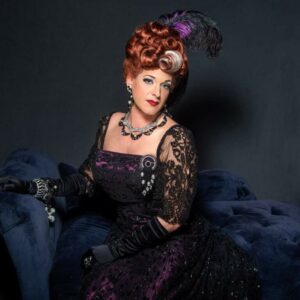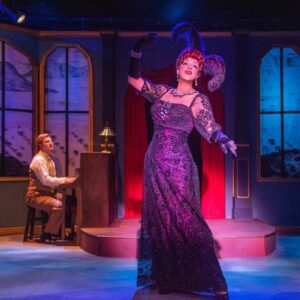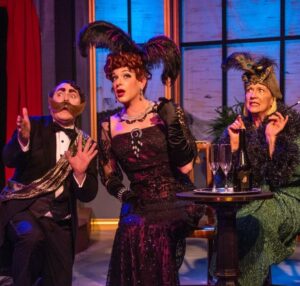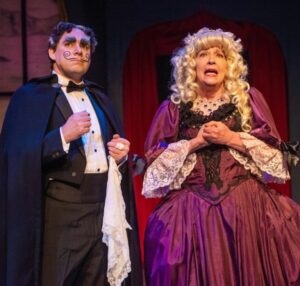The Confessions of Lily Dare
Charles Busch
New Conservatory Theatre Center

As two old friends reminisce before a grave whose tombstone they describe as alabaster white due to regular cleanings of baking soda mixed with Jack Daniels whiskey, one notes lovingly and admiringly of the grave’s occupant, “She wouldn’t let a geezer squeeze her tits for less than a twenty.” The friend they remember fondly and frankly was once one of the great madams of San Francisco’s notorious Barbery Coast’s grand houses of ill repute, Lily Dare. Their recalled memories become fodder for Charles Busch’s wild and wooly, laugh-out-loud tribute to both that period of the City’s history and to pre-code, Hollywood films of fallen women who sacrifice everything out of love for a child. Fueled by ample amounts of both camp and heart, New Conservatory Theatre Center’s West Coast premiere of Charles Busch’s The Confessions of Lily Dare is a trip down memory lane in which the hilariously melodramatic journey is a dream trip for any fan of the San Francisco drag scene.

First and foremost, the reason to grab a ticket for this latest NCTC offering by the much renowned playwright, actor, and drag queen extraordinaire, Charles Busch, is to relish J. Conrad Frank’s larger-than-life drag performance as Lily Dare. We first meet Lily as a young, recently orphaned teen who arrives in San Francisco at the turn of the 20th century to live in a house full of ladies of the night with her Aunt Rosalie who is a well-known, local madam. With saucer-size eyes full of naivite and a deliciously affected accent of European nature, Frank’s stylishly adorned Lily saunters with much exaggerated flair into the scene, towering over all the others she meets and ready to pursue a career of singing opera. When one of the ladies met says she must rush off to get into her nanny outfit for her five o’clock with the fire captain, “little” Lily just waves with a kind of ‘lah-tee-dah’ flip of her long locks, ready for her own adventures to begin.
Lily’s topsy-turvy ride through life includes hills and valleys that make those in San Francisco look like ant hills in comparison. A first love, soon-to-be-husband who is father of the child in her growing tummy is killed by the 1906 earthquake. Lily finds a way to support the baby daughter by employing her looks and her voice to become a Barbery Coast cabaret star, Miss Mandalay, soon to be of much fame and some fortune. But soon she is falsely accused of theft and thrown in prison, only to lose her toddler to a rich doctor and his wife’s adoption. Five years later she emerges from her cell, realizes the precocious child is better off in Pacific Heights with them than in the Tenderloin with her, and turns to her own career path as Miss Treasure Jones – soon to become the richest, most famous of all SF’s madams. Though now known to all, she dares not embarrass her daughter, Louise, by contacting her – Louise now being married to a European prince and herself a world-famous opera star. As she follow’s Louise’s fairy tale life through clipped, newspaper stories, her own life has many more twists and turns to go toward an end full of drama and despair.

Charles Busch’s script follows similar story lines of the bygone, pre-code films of 1929-34 – classic, similar tales of women who scrape the bottom in order to save their man or their child. His fictional Lily Dare as embodied by J. Conrad Frank is both a loving tribute to those divas and their stories as well as a chance to respectively play with all the exaggerations the actresses of the time employed on the big screen – both in the silents and the early talkies. J. Conrad Frank’s Lily is a glorious montage of a host of the great. His Lily’s accentuated eyes flutter as did Clara Bow’s; she smiles with the teeth of Bette Davis; and she tempts in the sexy style of Harlow while constantly quipping one-liners like Lombard. When she swishes across the stage in her gowns of satin and fluffed, feathered hair, we see Mae West. When she laughs with a sudden explosion of a guffaw, we hear any and many of these great queens of the pre-code films. And each time this Lily sings, she brings the volume, the gumption, and the command of her impressive vocals that would make any drag queen – past or present – proud. Charles Busch provides the means; and C. Conrad Frank time and again delivers the goods with bold, brassy, always BIG gesture, style, voice, and presence.

But our Lily and her tales of triumph and woe are also greatly enhanced by a surrounding cast who themselves have many chances playfully to recall scenes and characters of these films of old. Adam KuveNiemann jovially plays with perkiness and pep Lily’s loyal piano player, Mickey, who sticks with her through thick and thin, always smiling as his fingers gaily fly over the ivory and ebony keys that he never really touches. Equally true to Lily from beginning to end is the sweetest whore in the world, Emmy Lou, played with both tongue-in-cheek and genuineness of character by Sakura Nakahara. As Casino Lambert, LaMont Ridgell is the perfect villain whom we cannot help but both hiss and cheer as he sleazily swindles and bastardly betrays Lily but does so always with flair and style.

The slapstick stars of the evening are Marie O’Donnell and Kalon Thibodeaux who each play a number of silly souls that remind one of those oddballs seen in the films of the Marx Brothers. While Kalon Thibodeaux takes on the more sincere and serious role of Louise’s adopted father, Dr. Carlton, he makes a 180-degree turn when he becomes an enormously mustached and thick-eyebrowed Baron from Austria who goes into near epileptic fits as he peers at the bosoms of Lily’s nightclub persona, Miss Mandalay. As a thin and curled mustached Maestro Guardi, he is the cartoonish, French opera coach of the now-famed Louise, whose reputation as Verdi’s Violetta has spread from Paris to Milan and back to San Francisco.

While Marie O’Donnell draws her share of laughs as Lily’s red-haired, overly protective Aunt Rosalie (who only speaks in explosive blasts) and as a heavily accented and pompous Austrian Baroness, she brings huge howls of laughter and one of the night’s most sustained rounds of applause as Lily’s grown daughter, Louise. Just the appearance of a woman old enough to be at least Louise’s mother who comically takes on the mannerisms of a twenty-something is funny enough; but when she is Louise on the opera stage singing a famous aria of Violetta, our sides ache with laughter. The graying, elder-looking but young Louise shakes in spasms from head to toe, contorts her lips and face in all sorts of strange positions, and erotically moves arms and hands in her nether regions as she lip sings the famous aria.
Much frivolity of the evening is the result of perhaps the unlikeliest of sources: Elizabeth Boeckman’s lighting design. Repeated rounds of laughter greet each of the many scenes’ final seconds as a spotlight zeroes in slowly — and in its own way, melodramatically — to focus in the now-dark stage solely on a character’s scene-ending profile. Most often the spot is on the frozen features of a shocked, smirky, sad-faced, or sugary sweet Lily, with her silent-movie-like pose exaggerated in every respect to the hilt.
Fun is had also in the elaborate frills, folds, and feathers of Lily’s wide-arrayed wardrobe designed by Mr. David Glamamore as well as the caricatured costumes of all the other roles designed by Ruby V. Sogliuzzo. And the evening could not have happened without the wigs that bring their own salutes to the past stars of the silver screen, all designed by Deon.
So captivating in hilarity is Act One with the many appearances of the ever-changing Lily in name, age, and profession that Act Two has some trouble bringing the same level of zip and of zaniness. As the story begins to focus more on Louise and on darker times in Lily’s life, things seem to slow a bit overall. The script also calls for numerous insertions of a return to the graveside where Mickey and Emmy Lou still stand awash in their memories of Lily. They serve as narrators of sorts to fill in some gaps of her history, but sometimes those interludes fail to deliver much added value in storyline or laughs.
But in the overall picture, Director Allen Sawyer directs with full aplomb and much imagination this superb cast, especially ensuring that Lily herself has plenty of pause when needed to sustain her final syllables, to strut and flutter in full royal style as a queen of drag, and to give yet one more knowing look to us as audience, just daring us not to laugh. With The Confessions of Lily Dare, New Conservatory Theatre Center, Charles Busch, and J. Conrad Frank collectively celebrate the art of drag, the memories of some of the great movie divas of the past, and an early era of movie-making that must not be forgotten.
Rating: 4.5 E
A Theatre Eddys Best Bet Production
The Confessions of Lily Dare continues through June 11, 2023, in performance in the Decker Theatre of New Conservatory Theatre Center, 25 Van Ness Avenue, San Francisco. Tickets are available online at http://nctcsf.org .
Photo Credits: Lois Tema
